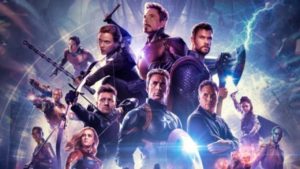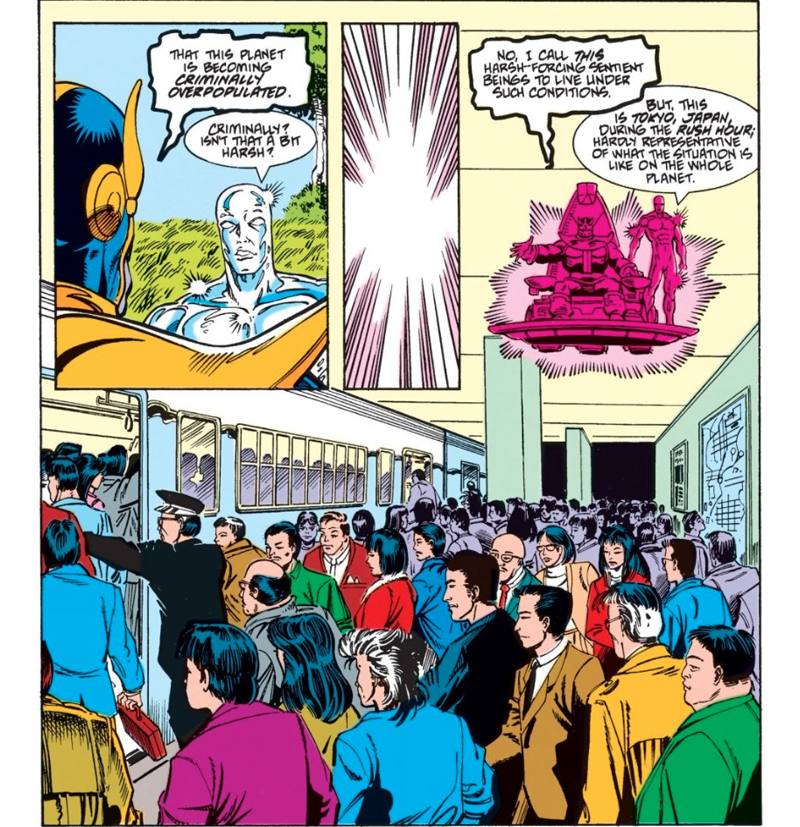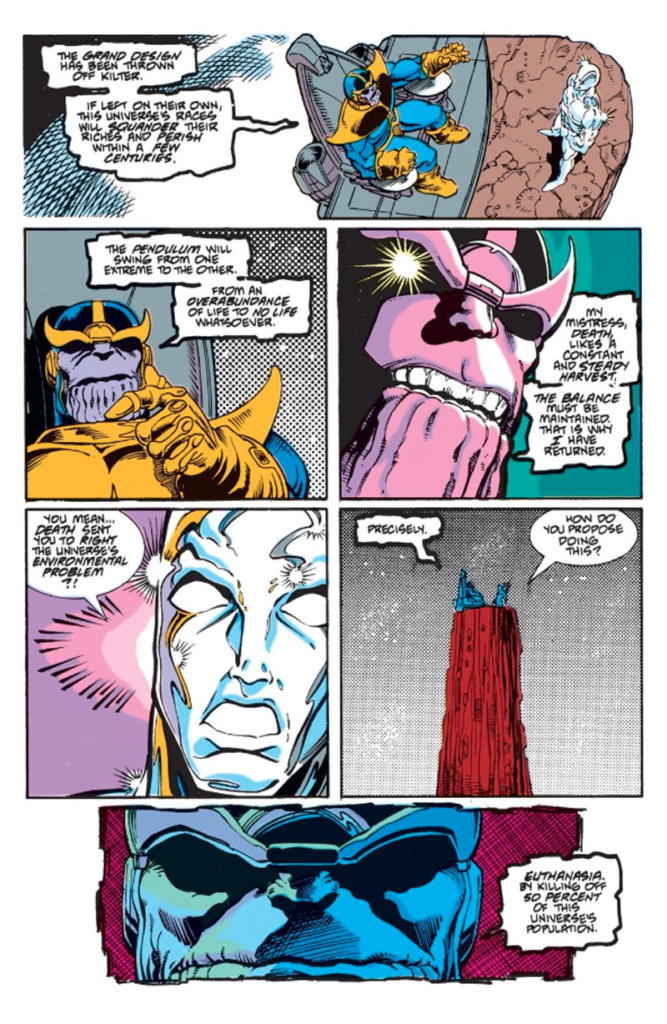I loved Avengers: Endgame (2019). Not every second of it, not every aspect of it. But overall, I have to say that I thoroughly enjoyed the experience of watching this movie.

Shock Value
When discussing Avengers: Endgame with my brother (to be a brother, you often have a brother, yeah?), this is what he said:
When President Trump won the race for President, for the first time in my life I had a feeling like “Is this real life? Is this the timeline of society I live in?”
The only other time I experienced something like that feeling was when Marvel Studios actually included that freakin’ snap at the end of Avengers: Infinity War (2018). I glimpsed a feeling: “Wow, did Disney just do this? For real?”
Nearly the entire time I watched Avengers: Endgame, I felt something like a continuation of that feeling.
I agree with my brother. The script for Avengers: Endgame resembled the crazy, no-rules approach to writing so often found in superhero comics, but typically lacking in the film adaptations of those comics (which tend to use simplistic, conservative scripts). I felt like I was watching a “comic book” movie for the first time. The experience of this movie was different from any Marvel or superhero film that has come before, far different even than its at-the-time-shocking precursor, Avengers: Infinity War (2018).
As I watched Avengers: Endgame, I felt like the directors and writers held nothing in reserve. They took huge risks with the characters, and included almost every character development idea they could think of (at least for the characters Marvel is phasing out). Some of these ideas I predicted (Iron Man dying; time travel), but many took me by surprise (like the heroes executing Thanos at the beginning).[1]I do mean execute, because Thanos did not resist the heroes or physically defend himself; the heroes had captured him and Thor just chopped his head off.
The film quickly established that the infinity stones were destroyed (impossible in the comics) and killed off Thanos (a wild idea also not in the comics), so I thought to myself: What will this 3-hour movie even be about? These initial shocking moments drew me into the story.
And shocking moments continued throughout the film. “Avengers: Age of Ultron” (2015) teased the possibility that Steve Rogers could be worthy of wielding Thor’s hammer, but I never expected him to actually pick it up. As my brother put it:
I saw Thor, Iron Man, and Captain America fighting Thanos, and I was thinking “Man, Captain America isn’t even relevant, poor guy. What else can he do though?” and in that exact second when I counted him out, he called the hammer and takes on Thanos by himself. This is one of the best moments in the cinematic history of fight scenes, or at least for superhero movies.
Unlike its predecessors, Avengers: Endgame did not feel chained to anything — not to the comics, not to the previous movies (despite their critical and commercial success), and certainly not to genre conventions. How could the capstone movie of the most popular, most money-making film franchise in history disregard the straightforward, predictable structures and ideas of its predecessors? I don’t know, but it was awesome. The film did not care at all about conventions in a very good way. I felt like I was watching something pure, pure in many senses of the word.
What Was Avengers: Endgame about?
I want to say that it wasn’t about anything, really, other than itself. The script, the feelings, the characters, almost everything in the film makes no sense at all unless you’ve watched nearly every single MCU movie. And even if you can comprehend what is happening, the movie has many emotional moments that only work if you care about the characters and what had been established in many of the previous films (not just Infinity War). Other than “the Snappening,” the content of Infinity War had little impact on the story (half of all people being dead had a huge impact on the plot, but other than the snap and its aftermath, the specific events of Infinity War were not referenced much).
There’s a long second act (the first act ending with the timeskip) dealing with the aftereffects of “the Snapture,” which is probably the bravest aspect of the movie. The script follows up on the most disturbing idea from Infinity War by examining the consequences of a death lottery, losing a devastating war, and a soft apocalypse, all in a realistic way. The characters go to therapy, succumb to depression, decide to retire, and can’t move past what has happened to their lives. I am fascinated that this action movie examines feelings like sadness, regret, and despair through something other than violence; the characters spend a lot of time just talking to each other about how they feel (of course, plenty of them resort to violence as well). The length of this act contributed significantly to the 3-hour runtime of the movie, but I think the directors made the right choice to include this character development and world-building.
The Time Heist
Then we get to the third act, the Time Heist.
The Time Heist was an incredible idea, because the time travel element allowed the film to traverse ideas from many of the previous movies in a literal way. Rather than just following up on or referencing the previous films, we got to see them in the style of “Back to the Future, Part 2” (1989). This raised the feeling of comic-book-ness to stratospheric heights, because going back to old locations, ideas, parallel universes, or the past is far easier to do in comic books (because the artists just draw the events) than live action (where maintaining continuity, bringing back actors, etc. is a logistical nightmare). Somehow, the studio made it happen!
There’s more to the brilliance of the Time Heist: these scenes harmonized, intelligently, many contradictory or confusing ideas established across the different MCU movies. For example, the idea that SHIELD was riddled with HYDRA moles was not established until “Captain America: Winter Soldier” (2014). But when the heroes went back in time to the events of “The Avengers” (2012), the writing acknowledged that the HYDRA moles would have been present at that time. This kind of writing, when done sloppily, is often criticized as a “retcon” (retroactive continuity). But when it is done well (as in Endgame), it is hard to even notice. If you pay attention though, you might notice more than a dozen examples of this thoughtful “harmonization.”
What I’m trying to say here is that Endgame did not just reference the specific movies that the heroes traveled back in time to get infinity stones from; the movie brought together everything that could be plausibly referenced from every other MCU movie (even though these movies were made years apart by different teams). Thus, Avengers: Endgame’s “Time Heist” sequence brought a greater level of cohesion to the MCU than we’ve ever seen (which is already, by far, the most cohesive of any “movie universe” attempted).
Technically speaking, I think the Time Heist was the most ambitious part of the movie. The filmmakers needed to get together a huge number of specific actors, maintain continuity with all the previous movies, and edit together an extremely convoluted narrative. That all could have been a disaster, but they hit a home run. When I ask my friends what their favorite moment was from the movie, nearly all of them pick something from the Time Heist.
Thanos
In “Avengers: Infinity War” (2018), Thanos prattled at length about his ridiculous Malthusian beliefs. Thomas Malthus was a pre-industrial English demographer who, more than 200 years ago, falsely predicted world-wide starvation as a consequence of population growth. World-wide hunger rates continue to decline, but somehow I never stop meeting people who embrace this pseudo-science. Although Infinity War spends a lot of time letting Thanos explain his insane perspective, none of the heroes was given a moment to even state that Malthusian beliefs are false as a matter of science. In the comics, Thanos’s Malthusian assertions were never treated as fact.
If I recall correctly, comic book Thanos murdered everyone on his home world Titan, but in Infinity War his backstory is changed to “prove” his Malthusian beliefs. Paradoxically, and reversing the morality of the comics, the Titans died not because Thanos murdered them, but because he didn’t. Thus, Infinity War allowed Thanos’s beliefs to stand as a “harsh truth” that must be resisted solely because murder is wrong (and not because Thanos is insane and/or an idiot).
Please peruse these excerpts from the comics:

From “Silver Surfer #35” (1990).

From “Silver Surfer #35” (1990).
In the comics, the hero Silver Surfer is basically making fun of Thanos’s stupid Malthusian ideas. We understand that Thanos is not just brutal, not just a sociopath, not just a murderer, but also a madman. [2]Hence the moniker, “the Mad Titan.” In my opinion, omitting any kind of counter-argument to what Thanos believes is a horrible flaw in the script for Infinity War (which clearly draws ideas from “Silver Surfer #35” (1990)). Infinity War portrayed Thanos as a misunderstood anti-villain who had the “courage” to live out his terrible destiny.
The script for Avengers: Endgame reigned in this Malthusian bullcrap and did a great job wrapping up the characterization for Thanos. Endgame shows us, unequivocally, that Thanos enjoys killing. We experience Thanos as a narcissistic psychopath who apparently enjoys watching footage of his own death. Endgame shows that Thanos will change his perspective to suit his goal of killing people, rationalizing his absurd goals just like he does in the comics. Thanos was just as willing to kill 100% of all people as 50%, showing that for all his charisma, he was nothing more than a simple murderer. This brings him a lot closer to the comic book version that I prefer.
Putting Thanos into a minor role was a big shift from the previous Avengers movie, in which he was practically the main character. Endgame took a lot of risks with this popular villain (killing him off; returning him but only as a simplified past version), and this was a good choice. Infinity War hardly seemed deserving of the “Avengers” title, but Endgame was definitely about the “Avengers” (specifically, the original six).
The two movies (Infinity War and Endgame), even though they are technically sequential, feel much more like parallel stories. The first is told from the perspective of Thanos, and the second is told from the perspective of everyone else. Infinity War gave us time to understand Thanos’s motivations, his ambition, his conviction, and so on. Endgame shows us how nearly everyone doesn’t understand, like, or benefit from anything Thanos did or ever would do. From the perspective of others, Thanos is a remorseless evildoer who hardly even deserves the swift death meted out to him by the heroes. Watching Endgame, I felt like heroes who think like Captain America are needed to protect us from villains who think like Thanos.
The Worst Problem
I liked the endings for most of the characters. By a big margin, though, Black Widow was the most poorly-treated character. In “The Avengers” (2012), Loki describes Black Widow as a “mewling quim” (an archaic term for female genitalia). In “Avengers: Age of Ultron” (2015), Black Widow describes herself as a “monster” because her assassin training involved her sterilization. And in “Avengers: Endgame” (2019) Black Widow throws herself off a cliff because Hawkeye sired children and her body has produced none. Good grief.
A disappointing ending for a character that has always been a poorly-written disappointment. That’s a real shame, since Black Widow was the first (and for a while, the only) female MCU hero.
The Ultimate Showdown of Ultimate Destiny
The final act calls to mind an old Neil Cicierega parody song, The Ultimate Showdown of Ultimate Destiny. My brother loved the final act:
At the end, when the whole crew starts showing up, Thanos is like “whatever don’t care.” And then there are more and he’s like “wait a second who are all these people jesus.” More keep coming and he’s like “am I screwed?” I love this scene. Of course, the emotional satisfaction of seeing all the characters come together felt earned because the heroes had worked so hard and risked so much to make this moment happen, but the directors’ decision to show Thanos’s reaction made this scene even more gripping and satisfying.
That final battle, visually, resembled a combination of the final battles from the previous movie (in Wakanda and on Titan). I liked how, in this way and other ways, the two movies pair together well.
I enjoyed seeing Thanos using his weapon and armor. I would have paid the full ticket price just to watch Captain America 1v1 Thanos for 2 minutes.
I also liked that there was a moment when all the female heroes gathered together; I had forgotten how many there are!
I enjoyed the suspenseful buildup during the Time Heist that past-Thanos was aware of what the heroes were up to. His character was written as so smart, capable, and dangerous that even him just knowing that the heroes are up to something is terrifying. Of course, he sneaks through the time machine with his ship, army, and all his allies. I found myself thinking: “There’s no way that they can beat Thanos’s unified forces; they couldn’t beat that army or Thanos the last time around, and the heroes are far weaker than before.” This tension created a true need for all the heroes from all the previous movies to return and assemble.
My favorite idea from this final act is that the heroes’ victory and the heroes’ defeat are so closely linked. The heroes need to build a new infinity gauntlet in order to restore the lives extinguished by Thanos in the last movie, but in doing so the heroes create the possibility that Thanos will kill everyone. So even though the heroes are so close to triumph, they are also as close to an even greater defeat as they can possibly get.
What a clever idea for the script!
The final battle is so freakin’ close. The Avengers and the forces of Thanos appear evenly matched this time. It all comes down to the final possession of the infinity stones. I felt like I was watching a football game with a tied score, with everything coming down to a trick play and an interception, the crowd going wild, anything about to happen! I felt like I really did not know what would happen because of all the craziness that had ensued up until that point.
A Second Viewing
With so many weird ideas undergirding Avengers: Endgame (shocking script ideas, a time skip, time travel, dead characters, unusual tone and pacing, etc.), the movie could have been a trainwreck. To be sure, Endgame was not the best or my favorite MCU movie, but considering how different it was, and considering how many risks the directors took, Endgame may be the most intriguing. Endgame deserves some kind of merit badge for taking the most risks and turning out to be a pretty good movie. I certainly like it more than any of the previous Avengers movies.
The movie earned its 3-hour run-time.[3]I could have used an intermission, though. I did not find any moment dull. There were so many good lines (I liked almost every joke) and so much to take in, I think the movie deserves a second viewing.[4]In particular, now that I know what actually happens, I would like to pay more attention to the performances of the actors. I am pretty sure that Robert Downey, Jr.’s performance is amazing just because it is somehow believable, especially if you consider that in many scenes he’s … Continue reading
I’ll buy another ticket soon.
Footnotes
| ↑1 | I do mean execute, because Thanos did not resist the heroes or physically defend himself; the heroes had captured him and Thor just chopped his head off. |
|---|---|
| ↑2 | Hence the moniker, “the Mad Titan.” |
| ↑3 | I could have used an intermission, though. |
| ↑4 | In particular, now that I know what actually happens, I would like to pay more attention to the performances of the actors. I am pretty sure that Robert Downey, Jr.’s performance is amazing just because it is somehow believable, especially if you consider that in many scenes he’s looking at almost nothing at all (because it’s all CGI’d in during post production). |
